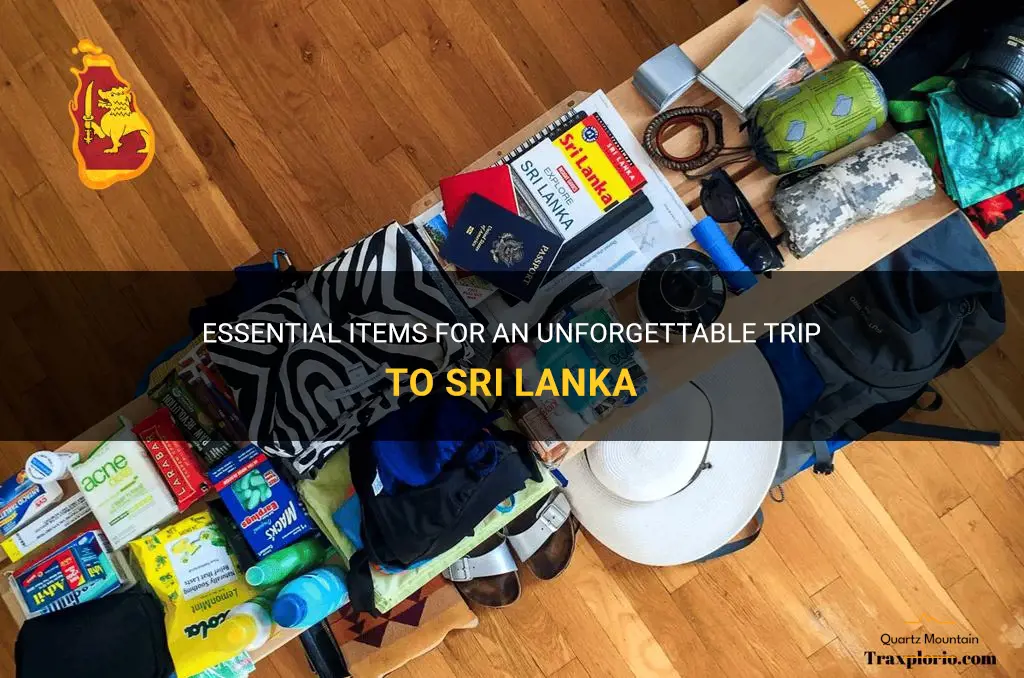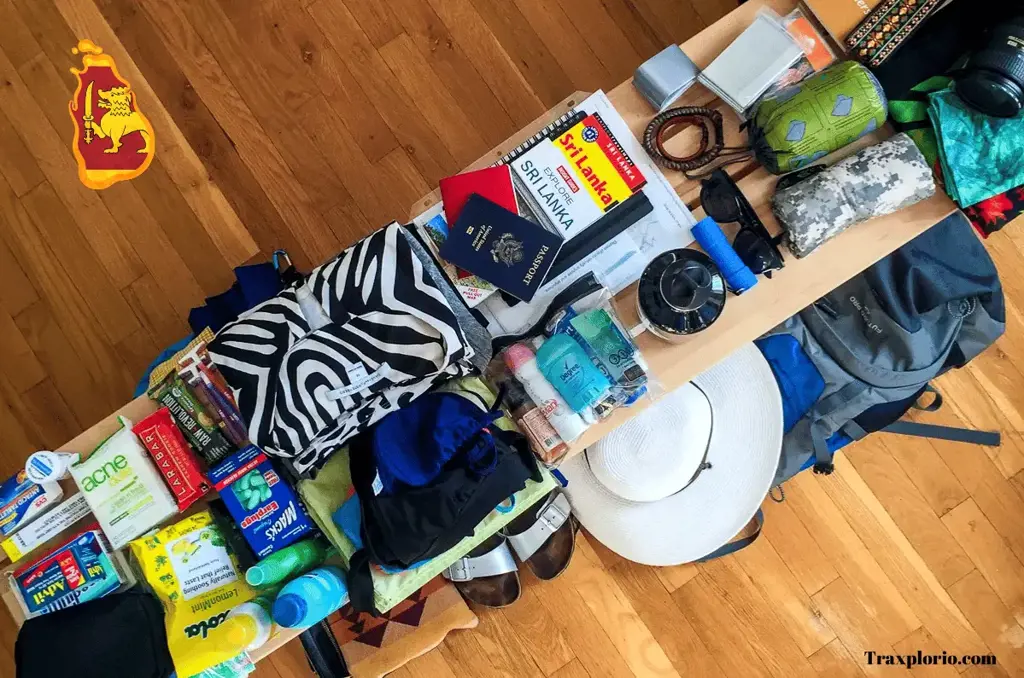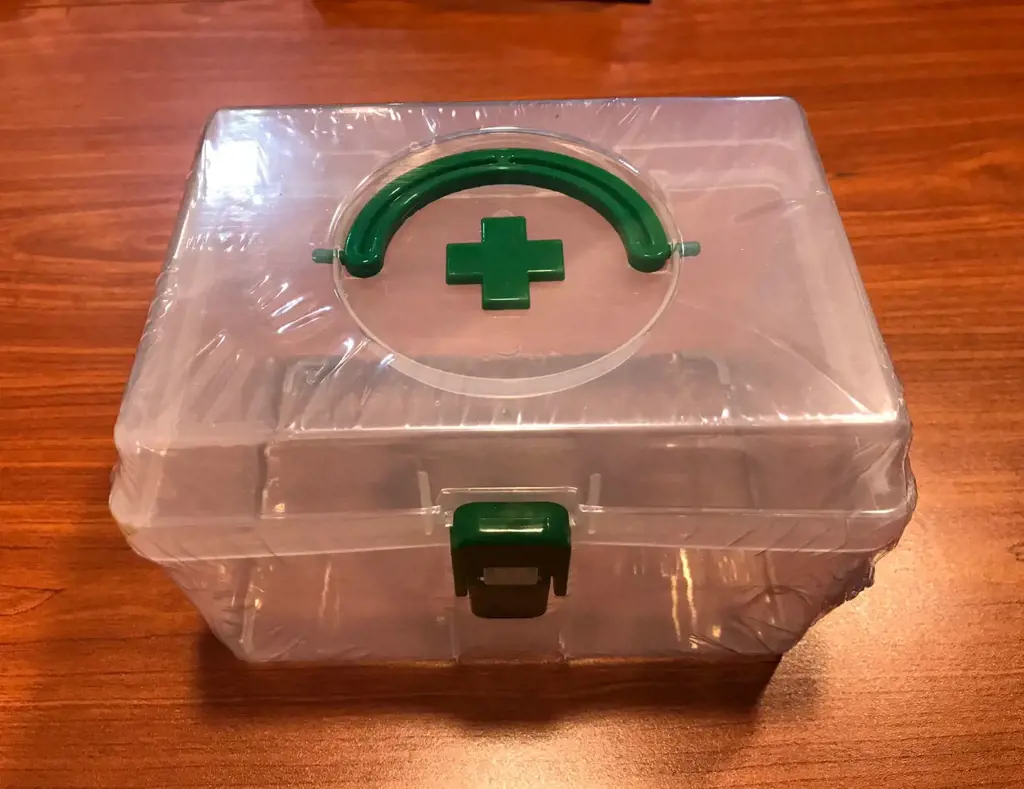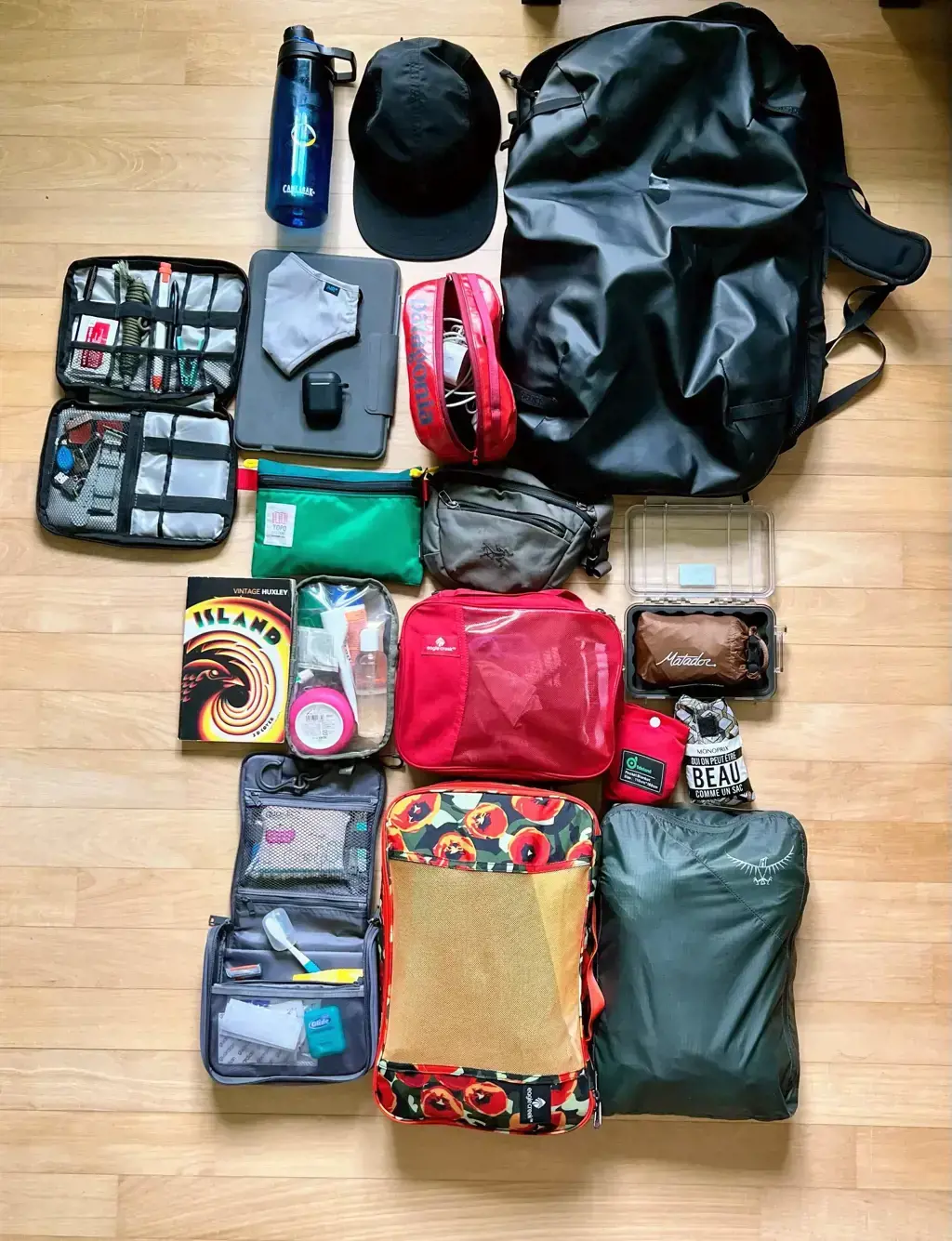
Are you ready to embark on an unforgettable adventure to the tropical paradise of Sri Lanka? This enchanting island off the southern coast of India offers a unique blend of stunning landscapes, rich history, and vibrant culture. Whether you're planning a relaxing beach getaway, a thrilling wildlife safari, or an exploration of ancient temples and tea plantations, it's essential to pack the right items to make the most of your trip. From lightweight clothing suitable for warm weather to insect repellent for those pesky mosquitoes, this guide will help you prepare for an extraordinary journey to Sri Lanka.
| Characteristics | Values |
|---|---|
| Clothing | Light and breathable clothing, swimwear, rain jacket, hat, sunglasses |
| Footwear | Comfortable walking shoes, sandals |
| Toiletries | Toothbrush, toothpaste, shampoo, conditioner, soap, sunscreen, insect repellent |
| Medications | Prescription medication, basic first aid kit |
| Electronics | Travel adapter, camera, phone, charger |
| Travel Documents | Passport, visa, travel insurance, itinerary, emergency contact information |
| Money | Cash (local currency), credit/debit cards |
| Accessories | Travel pillow, ear plugs, eye mask, travel locks |
| Snacks | Granola bars, nuts, dried fruit |
| Entertainment | Books, e-books, playing cards, portable games |
| Others | Travel umbrella, reusable water bottle, laundry bag, travel-size laundry detergent |
What You'll Learn
- What are the essential items to pack for a trip to Sri Lanka?
- Are there any specific clothing items or accessories that are recommended for travel in Sri Lanka?
- What should be included in a travel first aid kit for Sri Lanka?
- Are there any items that are prohibited or restricted for travel to Sri Lanka?
- How should I pack for different regions or climates within Sri Lanka?

What are the essential items to pack for a trip to Sri Lanka?

When planning a trip to Sri Lanka, it is essential to pack the right items to ensure a comfortable and enjoyable journey. Whether you are exploring the cultural sites of Colombo, hiking in the lush tea plantations of Nuwara Eliya, or lounging on the pristine beaches of Arugam Bay, here are some must-have items to include in your packing list.
Lightweight Clothing:
Sri Lanka has a tropical climate, so it's important to pack lightweight and breathable clothing. Opt for cotton or linen shirts, shorts, and skirts to stay cool in the hot and humid weather. Don't forget to pack a few long-sleeved shirts and pants for visits to religious sites and to protect yourself from mosquitoes in the evenings.
Sun Protection:
With its year-round sunshine, packing sun protection essentials is crucial. Bring a wide-brimmed hat, sunglasses, and sunscreen with a high SPF to shield yourself from the intense UV rays. It's also a good idea to pack a sun umbrella or a lightweight scarf for added protection.
Insect Repellent:
Sri Lanka is home to a variety of insects, including mosquitoes that can transmit diseases like dengue fever and malaria. To protect yourself from bites, pack an effective insect repellent with DEET and apply it regularly, especially during the early morning and evening hours when mosquitoes are most active.
Comfortable Footwear:
As you explore the rich landscapes of Sri Lanka, comfortable footwear is a must. Pack a sturdy pair of walking shoes or sandals with good grip to navigate the uneven terrain. If you plan on doing some hiking or trekking, consider packing a pair of waterproof shoes or boots to withstand the occasional rain showers.
Travel Adapter:
Sri Lanka uses Type D and Type G electrical outlets, so be sure to pack a travel adapter to charge your electronic devices. This will save you the hassle of finding one once you arrive and ensure that you can use your gadgets without any interruption.
Medications and First Aid Kit:
Don't forget to pack any necessary medications, as well as a basic first aid kit. It's a good idea to include essentials like pain relievers, antihistamines, anti-diarrheal medication, adhesive bandages, and any prescription medications you may need. While pharmacies are readily available in Sri Lanka, it's always best to come prepared.
Reusable Water Bottle:
To stay hydrated while you explore, pack a reusable water bottle. It's important to drink plenty of water, especially in the hot climate. Carry a bottle with a built-in filter or use purification tablets to ensure that the water you consume is safe.
Travel Insurance:
Ensure that you have comprehensive travel insurance that covers medical emergencies, trip cancellations, lost luggage, and other unforeseen circumstances. This will give you peace of mind during your trip and protect you financially if any unexpected situations arise.
Remember to pack light and only bring the essentials for your trip to Sri Lanka. With these must-have items on hand, you'll be well-prepared to make the most of your journey and have a memorable experience in this beautiful island nation.
Essential Items to Pack for the Huayhuash Circuit Hiking Adventure
You may want to see also

Are there any specific clothing items or accessories that are recommended for travel in Sri Lanka?

When traveling to Sri Lanka, it's important to consider the local climate and cultural norms when deciding what clothing items and accessories to pack. Here are some recommendations for what to wear during your stay in Sri Lanka.
- Lightweight and breathable clothing: Sri Lanka has a tropical climate, with high temperatures and humidity year-round. To stay comfortable, it's best to pack lightweight and breathable clothing made from natural fibers like cotton or linen. Loose-fitting tops, t-shirts, shorts, skirts, and dresses are all good options.
- Long-sleeved shirts and pants: While it may be tempting to wear short sleeves and shorts to beat the heat, it's important to consider protection from the sun and mosquitoes. Long-sleeved shirts and pants made from lightweight fabrics can protect you from the sun and minimize bites from mosquitoes and other insects.
- Swimwear: Sri Lanka is home to some stunning beaches and waterfalls, so be sure to pack your swimwear. Whether you prefer a bikini, one-piece swimsuit, or swim shorts, make sure to bring something suitable for swimming and enjoying the beautiful coastal areas.
- Sun protection: The sun in Sri Lanka can be intense, so it's important to protect your skin. Pack a wide-brimmed hat, sunglasses, and sunscreen with a high SPF. It's also a good idea to carry a lightweight scarf or sarong to cover your shoulders or head when visiting religious sites.
- Footwear: Sri Lanka's terrain can vary from sandy beaches to hilly tea plantations, so it's important to bring appropriate footwear. Comfortable walking shoes or sandals are ideal for exploring cities and cultural sites, while closed-toe shoes or hiking boots are necessary for treks and outdoor activities.
- Modest clothing for religious sites: Sri Lanka is home to numerous temples and religious sites, and it's important to dress modestly when visiting these places out of respect. Keep your shoulders, knees, and cleavage covered to avoid offending the locals.
- Insect repellent: Sri Lanka is known for its lush greenery and wildlife, which includes mosquitoes. To protect yourself from mosquito bites and possible diseases like dengue fever, it's essential to bring insect repellent. Opt for a brand that contains DEET or other effective repellent ingredients.
- Accessories: In addition to the essentials, there are a few useful accessories to consider packing for your trip to Sri Lanka. A sturdy backpack or daypack is essential for carrying your essentials while exploring. A lightweight rain jacket or umbrella may also come in handy as Sri Lanka experiences monsoon rains.
Remember to check the weather forecast before your trip to determine if you should pack any additional items like a light sweater for cooler evenings or a poncho for heavy rain. By properly planning your clothing and accessories, you can ensure a comfortable and enjoyable experience while exploring the beautiful island of Sri Lanka.
Pine Cove Towers: The Essential Packing List for a Memorable Stay amidst Nature's Beauty
You may want to see also

What should be included in a travel first aid kit for Sri Lanka?

When traveling to Sri Lanka, it is essential to be prepared and have a well-stocked first aid kit. A first aid kit can come in handy in case of minor injuries or illnesses while on your trip. Here are some items that should be included in a travel first aid kit for Sri Lanka:
Bandages and Dressings:
- Adhesive bandages of various sizes to cover cuts and blisters.
- Sterile gauze pads to clean wounds and prevent infections.
- Sterile dressings to control bleeding.
- Medical tape to secure bandages in place.
Antiseptic Solution:
- Antiseptic wipes or solution to clean wounds and prevent infections.
- Hydrogen peroxide or rubbing alcohol can also be used for this purpose.
Prescription Medications:
- If you take any prescription medications, make sure to pack an ample supply for the duration of your trip.
- It is also a good idea to carry a copy of the prescription or a letter from your doctor explaining the need for the medication, as customs may require it.
- Additionally, if you have any chronic illnesses or medical conditions, consult with your doctor about any additional medications or supplies you may need for your trip.
Over-the-Counter Medications:
- Pain relievers such as acetaminophen or ibuprofen.
- Antihistamines for allergies and insect bites.
- Anti-diarrheal medications.
- Anti-motion sickness medications, especially if you plan to travel by boat or car in Sri Lanka.
- Medications for indigestion or heartburn.
Insect Repellent:
- Sri Lanka is known for its mosquito population, and it is essential to protect yourself from mosquito-borne diseases such as dengue fever and malaria.
- Pack an insect repellent containing DEET or other recommended ingredients to prevent mosquito bites.
Sunscreen and After Sun Care:
- Sri Lanka has a tropical climate, and the strong sun can cause sunburns and heat-related illnesses.
- Carry a high SPF sunscreen to protect your skin from UV rays.
- Additionally, pack after-sun lotion or aloe vera gel to soothe sunburns.
Oral rehydration salts (ORS):
In case of dehydration from diarrhea or excessive sweating, ORS packets can help replenish electrolytes and prevent further complications.
Tweezers, Scissors, and Safety Pins:
These tools can come in handy for removing splinters, cutting bandages, or fixing clothing.
Hand Sanitizer and Moist Wipes:
Keep your hands clean while traveling by carrying a hand sanitizer and moist wipes. This can help prevent the spread of germs and keep you healthy.
Emergency Contact Information:
- Carry a list of emergency contact numbers, including local hospitals or medical facilities in Sri Lanka.
- It is also advisable to have a copy of your travel insurance information and any necessary medical documents.
Remember to check the expiration dates of all medications and replace them as necessary. It is also a good idea to consult with your doctor or a travel health professional before your trip to discuss any specific health concerns or recommendations for your travel first aid kit. By being prepared, you can enjoy your trip to Sri Lanka with peace of mind knowing that you have the necessary supplies to handle any minor medical issues that may arise.
Picnic Basket Perfect: Delicious Food Ideas for a Romantic Outing for Two
You may want to see also

Are there any items that are prohibited or restricted for travel to Sri Lanka?

When planning a trip to Sri Lanka, it's important to be aware of the items that are prohibited or restricted for travel. This is to ensure that you comply with the country's laws and regulations and avoid any unnecessary problems or delays during your trip. In this article, we will discuss the various items that are prohibited or restricted for travel to Sri Lanka.
- Firearms and weapons: It is strictly prohibited to bring firearms, explosives, or other weapons into Sri Lanka. This includes firearms such as pistols, revolvers, rifles, and shotguns, as well as explosives, ammunition, and any weapon that can cause harm or injury. Travelers found in possession of such items may face severe legal consequences.
- Illegal drugs: Sri Lanka has strict laws regarding the import and export of illegal drugs. Travelers should never attempt to bring any illegal drugs into the country, as drug trafficking is a serious offense that can lead to imprisonment or even the death penalty.
- Wildlife products: The trade of wildlife products is banned in Sri Lanka, and it is illegal to bring any such products into the country. This includes animal skins, ivory, and products made from endangered species. Travelers should be cautious when purchasing souvenirs to ensure that they are not made from illegal wildlife products.
- Pornographic materials: It is prohibited to bring any pornographic materials into Sri Lanka. This includes DVDs, magazines, or other adult content. Customs officials may screen your baggage, and if they find any prohibited materials, they have the authority to seize them and take appropriate legal action.
- Cultural artifacts: Sri Lanka has a rich cultural heritage, and it is illegal to export or remove any cultural artifacts from the country without proper authorization. This includes antiques, statues, artwork, and other items of historical or cultural significance. Travelers should be mindful of this and avoid purchasing or bringing back any such items without the necessary permits.
- Agricultural products: Sri Lanka has strict regulations regarding the import of agricultural products. Travelers are prohibited from bringing any fruits, vegetables, plants, seeds, or other agricultural products into the country without proper permission. This is to prevent the introduction of pests and diseases that could harm the local agriculture.
- Currency: There are restrictions on the amount of currency that can be brought into or taken out of Sri Lanka. Travelers are required to declare any amount exceeding USD 15,000 or its equivalent in other currencies upon arrival or departure. Failure to do so can result in the confiscation of the undeclared currency.
It is crucial for travelers to familiarize themselves with the regulations and guidelines set by Sri Lanka's customs and immigration authorities. This will help ensure a smooth and hassle-free travel experience. It is always recommended to check the latest regulations and guidelines before traveling to Sri Lanka, as they may change from time to time.
In conclusion, there are various items that are prohibited or restricted for travel to Sri Lanka. These include firearms, illegal drugs, wildlife products, pornographic materials, cultural artifacts, agricultural products, and large amounts of currency. Travelers should be aware of these restrictions and comply with them to avoid any legal issues or delays during their trip.
Essential Packing List for your Orange Beach, Alabama Vacation
You may want to see also

How should I pack for different regions or climates within Sri Lanka?

When preparing for a trip to Sri Lanka, it's important to consider the diverse range of climates and regions within the country. From tropical beaches to highlands and rainforests, each region has its own unique weather patterns and temperatures. Packing appropriate clothing and gear will ensure that you are comfortable and prepared for any situation during your Sri Lankan adventure.
- Research the weather: Before you start packing, research the weather conditions for the specific regions you plan to visit in Sri Lanka. The country experiences two monsoons, so the weather can vary significantly depending on the time of year and location. Make note of the average temperatures, rainfall patterns, and any extreme weather conditions to better understand what to expect.
- Lightweight clothing for beach destinations: If you plan to visit Sri Lanka's beautiful beaches, pack lightweight and breathable clothing. Opt for loose-fitting cotton shirts, shorts, and dresses that will help keep you cool in the hot and humid climate. Don't forget to pack swimwear, a hat, sunglasses, and sunscreen to protect yourself from the intense sun.
- Layering for highland regions: Sri Lanka's highland regions, such as Nuwara Eliya and Ella, experience cooler temperatures. Pack a mix of lightweight, long-sleeved shirts, sweaters, and jackets that can be layered to adjust to the changing temperatures. It's also a good idea to pack a waterproof jacket or poncho in case of unexpected rain showers.
- Rain gear for wet regions: Sri Lanka's southwestern and central regions receive heavy rainfall during the monsoon seasons. If you plan to visit these areas, pack a lightweight raincoat or poncho to keep you dry. It's also a good idea to bring waterproof shoes or sandals to navigate through muddy terrain.
- Hiking and adventure gear: Sri Lanka offers numerous hiking and adventure activities, particularly in the central highlands and rainforest regions. If you plan to engage in these activities, pack appropriate gear such as sturdy hiking shoes or boots, quick-drying pants, and moisture-wicking shirts. Don't forget to bring insect repellent, a first aid kit, and a good quality backpack to carry essentials during your outings.
- Miscellaneous items: In addition to clothing, there are a few other items you should consider packing for your Sri Lanka trip. These include a travel adapter for your electronics, a reusable water bottle to stay hydrated, a light backpack for day trips, and a travel towel that dries quickly.
Remember to pack light and only bring what you truly need for your trip to Sri Lanka. Having a versatile wardrobe that can be layered and adjusted to different climates will help you stay comfortable throughout your journey. Don't forget to check the baggage restrictions of your airline and consider investing in a high-quality suitcase or backpack that can withstand the rigors of travel. With careful planning and packing, you'll be well-prepared to explore and enjoy all that Sri Lanka has to offer.
Essential Items to Pack for a Life-Changing Mission Trip to Peru
You may want to see also
Frequently asked questions
When packing for Sri Lanka, it's important to consider the country's warm and humid climate. Lightweight and breathable clothing made from natural fabrics such as cotton or linen is recommended. Pack a mix of short-sleeve shirts, lightweight pants or shorts, and a light sweater or jacket for cooler evenings or air-conditioned places. Don't forget to bring a hat, sunglasses, and a swimsuit for the beach.
Yes, when visiting religious sites in Sri Lanka, it's important to dress modestly and respectfully. Both men and women should cover their shoulders and knees. It's a good idea to pack a sarong or a long wrap skirt, as well as a shirt or blouse that can be easily covered or layered. Some temples may require you to remove your shoes, so wearing slip-on shoes or sandals is also recommended.
Sri Lanka is known for its mosquito population, so it's important to pack insect repellent. Look for a repellent that contains DEET or a natural alternative like lemon eucalyptus oil. It may also be helpful to bring mosquito coils or a mosquito net for additional protection, especially if you'll be staying in more rural or remote areas. Don't forget to pack sunscreen as well, as the sun can be strong in Sri Lanka.
In addition to clothing and insect protection, there are a few other items that can be helpful to pack for your trip to Sri Lanka. These include a good quality travel adapter, as the electrical sockets may be different from your home country. It's also a good idea to pack a sturdy water bottle to stay hydrated, as well as a basic first aid kit with essentials like band-aids, antiseptic ointment, and any necessary prescription medications. Finally, be sure to bring a copy of your passport, travel insurance information, and important contact numbers in case of emergencies.







